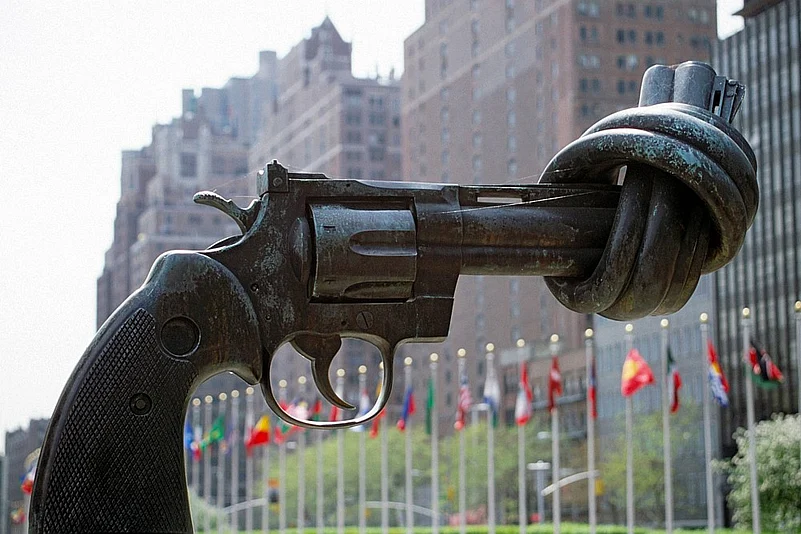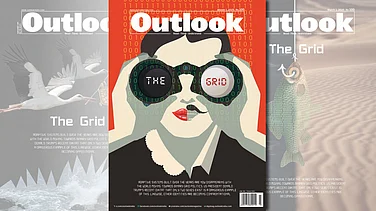The famed Swedish sculptor Carl Frederik Reutersward (who died in May this year) has made one of the most powerful symbols of 'Non-Violence'. It's a large replica in bronze of a .45 calibre revolver with a twisted barrel, (also known as the knotted gun) to symbolize peace and non-violence. In 1988, it was gifted by the Government of Luxembourg to the United Nations and it stands today at the UN Headquarters in New York.
October 2nd, is here once again. It is the birth anniversary of Mahatma Gandhi (born in 1869) and since 2007 the day has also been designated by the United Nations as "The International Day of Non-Violence". Gandhi, led India to freedom in 1947 but he also pioneered the philosophy and strategy of non-violence. He propagated the twin doctrine of 'ahimsa' (non-violence) and 'satyagraha' (the force of truth). Unfortunately, Gandhi was killed for the very causes he so fervently espoused; on January 30th 1948, he was assassinated by a right-wing fanatic giving credence to Gandhi's immortal words "there are many causes I would die for; there is not a single cause I would kill for!"
According to General Assembly resolution of 15 June 2007, which established the commemoration, 'the International Day of Non-violence' is an occasion to "disseminate the message of non-violence, including through education and public awareness". The resolution reaffirms "the universal relevance of the principle of non-violence" and the desire "to secure a culture of peace, tolerance, understanding and non-violence".
Never before has the world yearned for non-violence as it does today. The Global Peace Index (GPI) has used three important indicators to gauge the levels of peace and non-violence in 163 Countries of the world; these are (i) Militarisation (ii) Society & Security and (iii) Domestic and International Conflict.
Syria of course ranks last! The conflict which is in its sixth year has resulted in the deaths of thousands; millions have fled what they once called home, either becoming refugees or IDPs. The brutal and largely indiscriminate bombings these past weeks, have hogged the headlines the world over. Sadly, no solution seems to be in sight and the blood-letting continues. Several other parts of the Middle East seem to have accepted violence as a way of life. Many other countries from across the globe, from Asia to Africa to South America are today caught in the web of violence; in a vicious circle as each act of violence begets an even deadlier one.
A few days ago, after the killing of a black American by a white Police Officer, in Charlotte US, the tearful yet very powerful testimony of a little girl Zianna Oliphant, went viral on social media. "Please don't kill our fathers and mothers", she pleaded, "we need them by our sides!" A moving message highlighting what discrimination and violence can do to any society. According to the US gun violence statistics, 'more than 30,000 people are killed by firearms each year in the US'. And this is just one type of violence that has gripped society there.
India is ranked 141 in the GPI. Certainly no credit to a country that has given birth to Gandhi. Acts of violence seem to have become the order of the day across India. At the receiving end of this are the dalits, the adivasis, and the minorities. Women and children suffer the most. Cow vigilitanes and other right-wing forces have taken law and order in their own hands and killed innocent people. Children of corporate bigwigs can run over poor people sleeping on the pavements and get away with it. A good part of the violence seems to have the complicity of the Government or its tacit approval.
The recent posturing of war both by India and Pakistan, does not augur well for peace in the subcontinent. The people of these countries do not want war (a petition to this effect has been signed by several citizens). India today is the second biggest buyer of warfare in the world. The same companies, the same countries will happily sell arms and ammunition to Pakistan too.
An International Day of Non Violence will make sense, if the arms and ammunition industry, the mercenaries and arms smugglers are addressed, contained and even stopped. The business is lucrative, generating huge profits and also benefitting politicians and other vested interests, from across the spectrum. Many of them have no qualms of conscience, as they happily watch innocent blood being spilled.
Non-violence is certainly about actions, but also about our attitudes and articulations: the way we look at the other; the way we accept him/her. It is about our ability and courage to stop this institutionalisation of violence and to ensure that our world becomes more just, more humane, more inclusive and more peaceful.
The idea behind the knotted (twisted) gun was also to honour John Lennon, (who was gunned down in 1980) for his vision of a world at peace. At the time of his death John Lennon was one of the most public advocates for peace and non-violence and in many of his songs, both as part of the famous pop group 'The Beatles', and together with his wife Yoko Ono, the lyrics focused on the vision of a world without violence. Here are the final lyrics of his most famous song, Imagine:
"Imagine all the people living life in peace
You may say that I'm a dreamer
But I am not the only one
I hope someday you'll join us
And the world will live as one."
May the blood of Mahatma Gandhi and John Lennon, inspire us in the building a more non-violent world!
Fr Cedric Prakash SJ is a human rights activist, currently based in Lebanon and engaged with the Jesuit Refugee Service (JRS) in the Middle East on advocacy and communications.
















